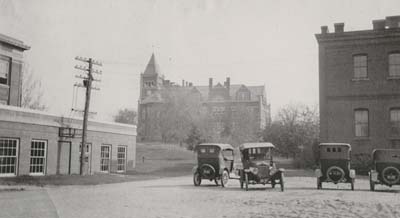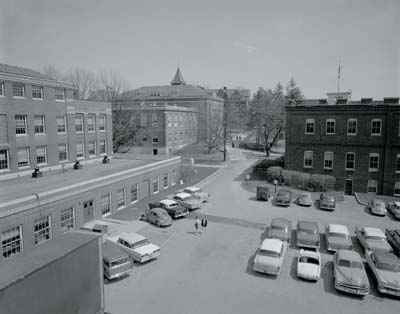 |
 |
| current issue |  |
past issues |  |
send a letter/news |  |
address update |  |
advertise |  |
about us |  |
alumni home |
On Ben's Farm
Dear Enforcement OfficerFirst came cars. Then parking.
by Mylinda Woodward '97
 HOT RODS: Cars in Conant courtyard in 1924, and mid-'60s, below.
HOT RODS: Cars in Conant courtyard in 1924, and mid-'60s, below.
|
In the beginning, there was no difficulty parking on campus. There were, after all, no cars to park. Even by 1915, seven years after the first Ford Model T was sold, professor of animal husbandry Otto Eckman was so confident that the automobile would never replace the horse that he toured the state advising farmers to breed draft horses.
A few months later, the college dairy department purchased a Ford truck. Soon 10 faculty members also succumbed to the lure of motor vehicles. The new owners undoubtedly found that parking their Tin Lizzie on campus was much easier than finding gas or a mechanic—it was simply a matter of pulling up as close as possible to their destination. As more professors took to driving cars to work, they adopted the city-style system of lining up their cars in open lots, including the courtyard behind Conant Hall.
By 1926, the Board of Trustees voted to bar students from operating cars on campus without written permission. Proof was required to show the applicant needed a car for commuting or business; officials said the reason was that the grades of car owners were much lower than non-owners.

|
The post-World War II jump in enrollment brought with it a parking crunch. New parking lots were created in any available space. In 1950, the widespread disregard of parking regulations led President Arthur S. Adams to appoint a committee to investigate the problem. The committee concluded that "some faculty and staff members seem unusually vehement in their desire to park as close to office space as mechanically possible and to do as little walking as possible. It is almost a cycle without end: some faculty disobey, parking officials punish, faculty get angry, disobey again, parking officials get tactless in treatment, etc."
Today, of course, parking, like the weather, is a perennial subject of joy or consternation, depending on the conditions. Efforts to address the issue continue, including a carpool program, extra bus routes and shuttle busses that ferry drivers from the 783-space West Edge parking lot. Still, parking regulations—and tickets—remain a fact of life; Marc Laliberte '89, transportation operations manager, admits staff members post the most creative appeals on a "Hall of Fame." One habitual offender, who over the years had submitted some especially imaginative treatises, sent in his last appeal before graduation with the note, "Keep up the good work. I wouldn't ever consider going anywhere else for my parking violations. I look forward to doing business with you again."
blog comments powered by Disqus
